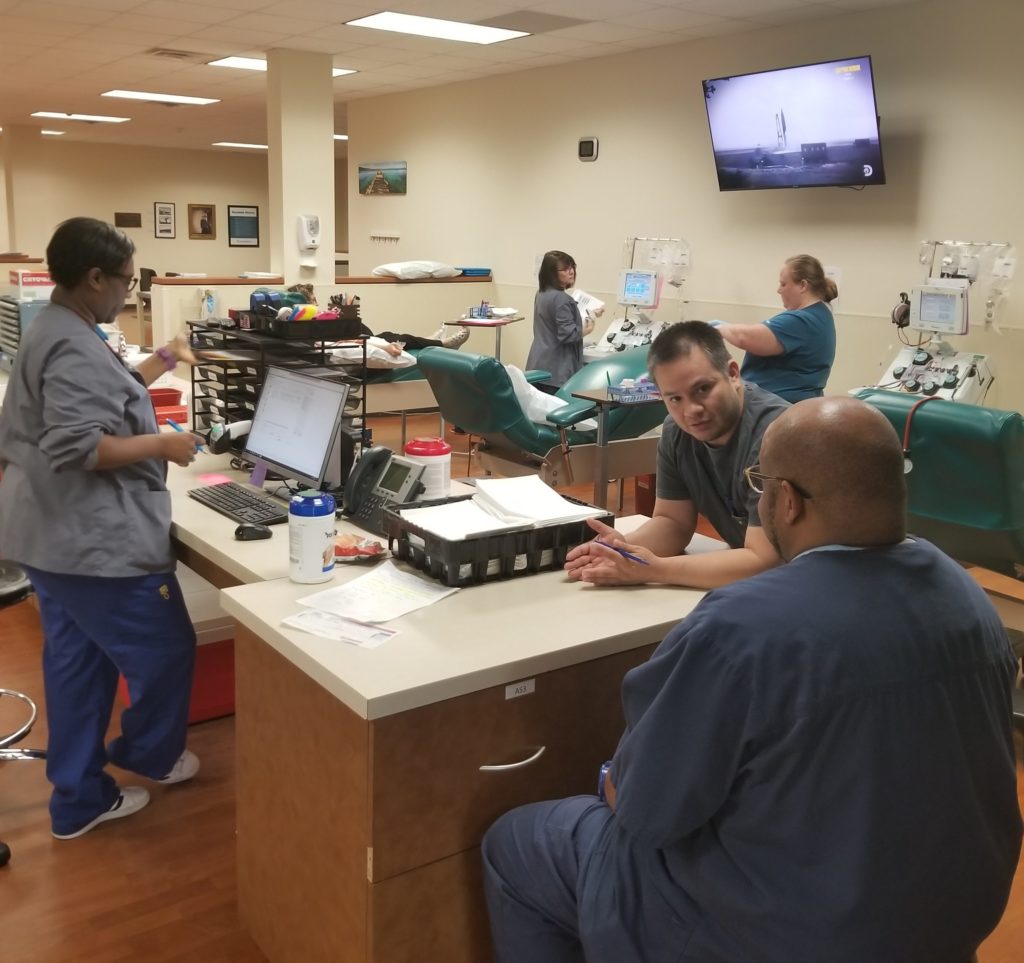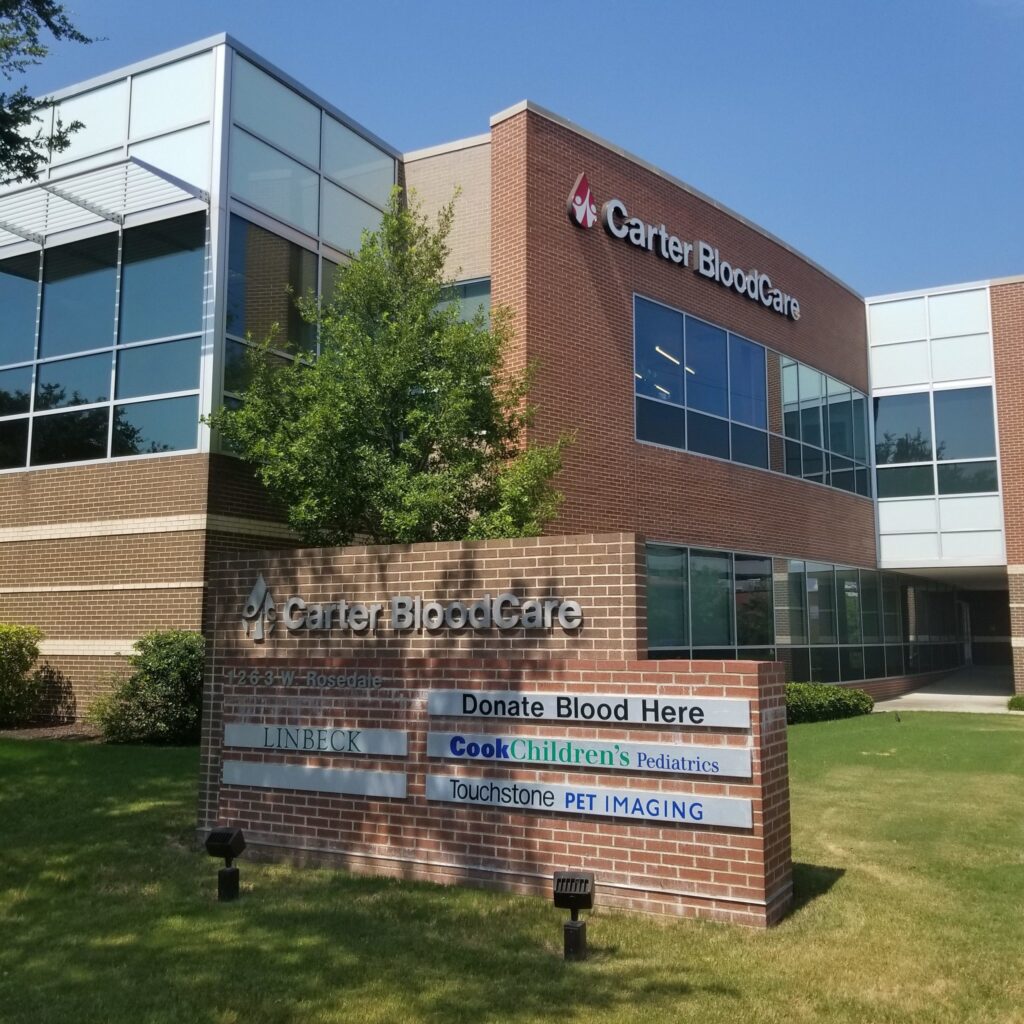Donor Center Series: Rosedale
This article is part of a regular series highlighting each of Carter BloodCare’s donor centers, their teams and their commitment to serving communities by fulfilling the mission to save lives by making transfusion possible.
Delivering Great Experiences That Stick Well at the Rosedale Donor Center in Fort Worth
Expertise, education and recruitment are making the donor difference
For new donors, it can all come down to the “stick.”
“What actually happens with the needle is very important,” said Site Supervisor Ricky Wingham with Carter BloodCare’s Rosedale Donor Center in Fort Worth. “The experience they have – that it’s a really good donor experience – is one of the main things that will help people get over their fears and come back.”
Fortunately, their arms are in good hands with the Rosedale team.
“This team is made up of mostly senior staff,” said Donor Center Manager Frances Carson. “The majority have been with Carter BloodCare for over 10 years.”
“I’m not even the longest running employee here,” said Wingham, who’s worked nearly 15 years with Carter BloodCare. “So when you have a donor who’s new, it helps to let them know, ‘OK, we’re going to give you this person who’s been here for 10 years and they’re going to take good care of you.’ That makes a difference. It’s a big part of customer experience.”
That level of expertise translates into great experiences for new and returning donors like James Salinas of Burleson.
“I haven’t donated in a long, long time, but my wife has. She’s donating now,” he said as he waited in the Rosedale center’s canteen area. “I’m afraid of needles, but I donate because we all know blood is needed all year round.”
Putting donors at ease by delivering a positive experience is a source of pride for Wingham’s team, which includes Phlebotomists 2 Krystal Cervantes, Crystal Dobbins, Jose Ortega, Tawahna Renfro and Jane Williams, and Phlebotomists 1 Ruschelle Hess and Brittney Williams.
The Rosedale location typically processes 25 to 35 donors a day, with a weekly average of more than 120 donors.
“The past couple of weeks, it’s been a little heavier than normal. The difference is, we’re seeing different people; we’re seeing a lot of new faces now, which is a good thing,” said Wingham. “There are a lot of new donors coming in. I think they know what’s going on; they’ve heard the different calls and appeals to deal with our blood shortage.”
An essential part of Fort Worth’s Medical District
The Rosedale facility is conveniently located in the world-class Medical District near downtown Fort Worth, an area also known as Near Southside. Of historical note, the current building sits on the site of Fort Worth’s original Carter Blood Center, which was chartered in 1959 through a grant by the Amon G. Carter Foundation.
The Medical District is home to Tarrant County’s major hospitals and dozens of independent clinics.
The Near Southside neighborhood roster reads like a Who’s Who of leading health care institutions, including Cook Children’s Medical Center, which also has pediatric offices on the second floor of the Carter BloodCare-owned Rosedale Street building; Medical City Fort Worth; JPS Health Network’s Patient Care Pavilion; Baylor Scott & White All Saints Medical Center – Fort Worth; Texas Health Harris Methodist Hospital Fort Worth and UT Southwestern’s Moncrief Cancer Institute, among many others.
“We do interact with them and we see a lot of people who work in the area. We meet people from every aspect of life here,” said Wingham. “A lot of times, they’re donating not because of something that happened to them, but to someone they know.
“There are sick people that need blood and other products, and the hospitals rely on us to have the products available. It’s important to be part of that big cycle that helps people,” he said. “I don’t want us to ever forget how important this side of it is.”
The center houses six donor beds for blood product collection, with four screening booths.
Rosedale typically collects more donations of whole blood, in which one unit or pint of blood is taken for separation into its component parts later in the lab.
However, the center holds the distinction as one of only two in Carter BloodCare’s service area – the Preston Valley site in North Dallas being the other – that conducts clinical apheresis.
Educating donors on apheresis
For donors who may not be familiar, apheresis is an automated process which allows them to maximize their donations for their blood types and give specific components. The apheresis instrument works by centrifugation of blood drawn from the donor. It layers the cells of the blood by weight or density and separates them from the liquid, while maintaining them in a closed circuit to prevent contamination.
The instrument can then draw out the desired part or parts of the blood into a sterile bag for storage. Most automated donations consist of a combination of platelets, red blood cells and plasma.
Though apheresis requires a longer time commitment – typically up to two hours – from the donor, it allows for a more generous donation of each of these components than whole blood donation would.
“On the apheresis side, we see about eight to 10 of these donors a day, about 45 to 55 per week,” said Wingham. “We once did 22 in one day and that was pretty incredible, but I’d still like to see more focus on apheresis.”
Ultimately, that focus is driven by the mission to help as many people as possible.
“We always want to be the most productive and maximize the donor potential, letting them know there are other things that are needed, not only whole blood,” said Wingham. “People who come in to give blood, they’re open to listening to that, because they’re really here to help.”
Ortega, who has worked with Carter BloodCare for 14 years, agreed.
“That’s something I pride myself in what I do – educating our donors, giving them direction as needed on where we can have the best results, building those donor relationships, helping them really understand what we do and how they can help in the best way they can,” he said.
Wingham added, “Information is a big part of recruiting, because recruiting and asking are two different things. If I just ask a person to do something, they may have no idea what it is and more than likely will just say no.
“But if I’m recruiting a person, then I’m letting them know all the advantages, why we do it, what it’s used for. In that way, I have a better chance of reaching that person and it’s easier to convince them to try donating other blood products, like platelets,” he said.
In particular, platelets are vital components used primarily for treating cancer patients, those undergoing heart surgery, and people with traumatic injuries.

Unlike whole blood donations, which can be made every 56 days, platelet donations through apheresis can be performed every two weeks.
“I have two aunts and a cousin who receive platelets, so it’s very important to me,” said Renfro, a 14-year Carter BloodCare team member. “If donors ask me, or if they’re first-time platelet donors, I tell them how important platelets are. We try to educate our donors on the importance of platelets because there are so many cancer patients and people who need them right now.”
A reason to return
“Everyone always has a story for why they donate,” said Dobbins, who has worked with Carter BloodCare for 22 years. “It might be something in their life that hit them hard or they have a relative that was impacted, but everyone has a reason for why they continue to donate.”
A friendly, welcoming environment and a cohesive, knowledgeable team of phlebotomists are influential factors in transforming first-timers into repeat donors.
“Ultimately, once a person walks through that door, even if they have this great fear of needles, they’ve already decided they want to challenge that fear,” said Wingham. “That’s a big part of why they’re here in the first place.”
For Salinas, the highly experienced team at the Rosedale Donor Center made a positive difference in helping him overcome his fears.
“You can get busy with life and kids and work and everything that’s going on, even being afraid of needles, but this is important and there’s a big need,” he said, as he and his wife prepared to leave after their donations.
But before they did, he had this promise to share:
“We’ll make it a habit now to keep coming back.

Details:
Carter BloodCare
Rosedale Donor Center
1263 W. Rosedale St., Ste. 100
Fort Worth, TX 76104
817-335-4935
Hours of operation:
Monday – Friday 8 a.m. – 5 p.m.
Saturday 8 a.m. – 2 p.m.
Sunday Closed
Carter BloodCare’s team at the Rosedale Donor Center in Fort Worth is ready to see you for your next lifesaving donation to help Texas patients in need. To find additional donor centers, visit carterbloodcare.org or call/text 800-366-2834 for an appointment.
